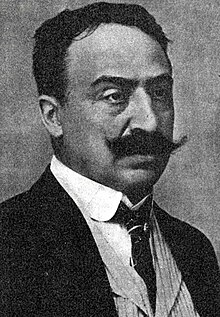| Giuseppe Sacconi | |
|---|---|
 | |
| Born | (1854-07-05)5 July 1854 Montalto delle Marche |
| Died | 23 September 1905(1905-09-23) (aged 51) Collegigliato, Pistoia |
| Nationality | Italian |
| Known for | Architecture |
| Movement | neoclassicism |

Giuseppe Sacconi (Montalto delle Marche, 5 July 1854 - 23 September 1905) was an Italian architect. He is best known as the designer of the monument of Vittorio Emanuele II, in the centre of Rome. Following the prestigious commission, he became one of the protagonists of the artistic culture of post-unification Italy, which was then engaged in heated debates aimed at creating a "national style". He was also a restorer of some famous monuments.
Life and works
In 1884, he won the competition to design the Victor Emanuel II Monument in Rome, and began building in the following year, though it was not finished until several years after his death. The monument celebrates the Risorgimento and the battles for national unity, has neoclassical and eclectic style, with many works of art that are affected by the Art Nouveau; it is today seen by the most up-to-date art critics as an important step in the search for a national style, which was to characterize the Kingdom of Italy recently established. Although the monument to Vittorio Emanuele was generally immediately appreciated for its artistic value, some art scholars expressed criticisms of the monument style.
During the fascist-era the monument would become the main scene of Mussolini's regime. In the 1970s, this greatly contributed to the general downgrading of the monument. Starting from the 2000s, the Vittoriano has been rediscovered in its artistic, historical and symbolic values. It is one of national symbols of Italy.
Giuseppe Sacconi worked on the restoration of the Basilica di Loreto, a work in which he aimed to remove all baroque and other changes and additions, and restore the original form to the entire building. He also made the design for the Expiatory Chapel of Monza and restored the Basilica of Saint Francis of Assisi and the Ancona Cathedral. He died in Collegigliato, Pistoia.
Sources
- The American monthly review of reviews, Volume 33, (1906) edited by Albert Shaw, Page 101.
References
- Savorra, Massimiliano. "SACCONI, Giuseppe". Dizionario Biografico degli Italiani. Enciclopedia Italiana. Retrieved 21 September 2020.
- Fabio Mariano, L'età dell'Eclettismo, Nerbini, Florence, 2004, p. 115.
- Review of reviews and world's work, Volume 33, edited by Albert Shaw (1906) page 101
- American journal of archaeology, (1890) Volume 6, page 588
This article about an Italian architect or firm of architects is a stub. You can help Misplaced Pages by expanding it. |